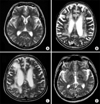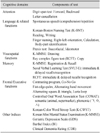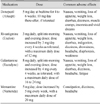Abstract
Dementia is defined as a primary decline of intellect and/or comportment due to a structural and chemical brain disease to the point that customary activities of daily living (ADLs) become compromised. Korean society is rapidly becoming an aging society where average age increases, and dementia is becoming more prevalent. Therefore, prevention, early detection, and proper management of dementia patients are health- and social-care priorities of Korean society. Neurorehabilitationist means a specialist for rehabilitative care of neurologically compromised patients including stroke, traumatic brain injury, degenerative brain disease, and dementia. However, the role of neurorehabilitationists for the diagnosis and treatment of dementia are not well established compared to that of neurologist and psychiatrist. Therefore, this article deals a role of neurorehabilitationist for proper management of patients with dementia in a way that preventing the functional deterioration as well as reduction of national welfare burden.
Figures and Tables
Fig. 2
Hippocampal MRI scans from patients with normal cognition (A) and Alzheimer's dementia (B). The arrows depict the hippocampal formations and (B) shows significant atrophy compared with (A).

References
1. Querfurth HW, LaFerla FM. Alzheimer's disease. N Engl J Med. 2010; 362:329–344.
2. Department of Social Work. Present Report for Management of Dementia. National Assembly Budget Office;2014.
3. Cheong HK. Epidemiology of the Dementia. Korean Dementia Assocation. Dementia: a clinical approach. Seoul: Academia;2011. p. 49–61.
4. Mayeux R. Clinical practice. Early Alzheimer's disease. N Engl J Med. 2010; 362:2194–2201.
5. Plassman BL, Langa KM, Fisher GG, Heeringa SG, Weir DR, Ofstedal MB, et al. Prevalence of cognitive impairment without dementia in the United States. Ann Intern Med. 2008; 148:427–434.
6. Petersen RC, Thomas RG, Grundman M, Bennett D, Doody R, Ferris S, et al. Vitamin E and donepezil for the treatment of mild cognitive impairment. N Engl J Med. 2005; 352:2379–2388.
7. Levey A, Lah J, Goldstein F, Steenland K, Bliwise D. Mild cognitive impairment: an opportunity to identify patients at high risk for progression to Alzheimer's disease. Clin Ther. 2006; 28:991–1001.
8. Jeong HG, Han C. Diagnosis and treatment of dementia in primary care. J Korean Med Assoc. 2013; 56:1104–1112.
9. Kales HC, Gitlin LN, Lyketsos CG. Management of neuropsychiatric symptoms of dementia in clinical settings: recommendations from a multidisciplinary expert panel. J Am Geriatr Soc. 2014; 62:762–769.
10. Mitchell AJ. CSF phosphorylated tau in the diagnosis and prognosis of mild cognitive impairment and Alzheimer's disease: a meta-analysis of 51 studies. J Neurol Neurosurg Psychiatry. 2009; 80:966–975.
11. Dickerson BC, Sperling RA, Hyman BT, Albert MS, Blacker D. Clinical prediction of Alzheimer disease dementia across the spectrum of mild cognitive impairment. Arch Gen Psychiatry. 2007; 64:1443–1450.
12. Shin JH. Diagnosis of Dementia: Neuropsychological Test. Korean J Fam Med. 2010; 31:253–266.
13. Pary R, Tobias CR, Lippmann S. Dementia: what to do. South Med J. 1990; 83:1182–1189.
14. Mucke L. Neuroscience: Alzheimer's disease. Nature. 2009; 461:895–897.
15. Andreasen N, Minthon L, Davidsson P, Vanmechelen E, Vanderstichele H, Winblad B, et al. Evaluation of CSF-tau and CSF-Abeta42 as diagnostic markers for Alzheimer disease in clinical practice. Arch Neurol. 2001; 58:373–379.
16. Sjogren M, Davidsson P, Tullberg M, Minthon L, Wallin A, Wikkelso C, et al. Both total and phosphorylated tau are increased in Alzheimer's disease. J Neurol Neurosurg Psychiatry. 2001; 70:624–630.
17. Kohnken R, Buerger K, Zinkowski R, Miller C, Kerkman D, DeBernardis J, et al. Detection of tau phosphorylated at threonine 231 in cerebrospinal fluid of Alzheimer's disease patients. Neurosci Lett. 2000; 287:187–190.
18. Schroeter ML, Stein T, Maslowski N, Neumann J. Neural correlates of Alzheimer's disease and mild cognitive impairment: a systematic and quantitative meta-analysis involving 1351 patients. Neuroimage. 2009; 47:1196–1206.
19. Rosano C, Aizenstein HJ, Newman AB, Venkatraman V, Harris T, Ding J, et al. Neuroimaging differences between older adults with maintained versus declining cognition over a 10-year period. Neuroimage. 2012; 62:307–313.
20. Yuan Y, Gu ZX, Wei WS. Fluorodeoxyglucose-positron-emission tomography, single-photon emission tomography, and structural MR imaging for prediction of rapid conversion to Alzheimer disease in patients with mild cognitive impairment: a meta-analysis. AJNR Am J Neuroradiol. 2009; 30:404–410.
21. Ministry of Health and Welfare. National comprehensive plan for management of dementia. Ministry of Health and Welfare;2012.
22. Ferri CP, Prince M, Brayne C, Brodaty H, Fratiglioni L, Ganguli M, et al. Global prevalence of dementia: a Delphi consensus study. Lancet. 2005; 366:2112–2117.
23. Mayeux R. Epidemiology of neurodegeneration. Annu Rev Neurosci. 2003; 26:81–104.
24. Duyckaerts C, Delatour B, Potier MC. Classification and basic pathology of Alzheimer disease. Acta Neuropathol. 2009; 118:5–36.
25. Ikeda M, Hokoishi K, Maki N, Nebu A, Tachibana N, Komori K, et al. Increased prevalence of vascular dementia in Japan: a community-based epidemiological study. Neurology. 2001; 57:839–844.
26. Al-Qazzaz NK, Ali SH, Ahmad SA, Islam S, Mohamad K. Cognitive impairment and memory dysfunction after a stroke diagnosis: a post-stroke memory assessment. Neuropsychiatr Dis Treat. 2014; 10:1677–1691.
27. Kanekar S, Poot JD. Neuroimaging of vascular dementia. Radiol Clin North Am. 2014; 52:383–401.
28. Kuruppu DK, Matthews BR. Young-onset dementia. Semin Neurol. 2013; 33:365–385.
29. Baumer D, Talbot K, Turner MR. Advances in motor neurone disease. J R Soc Med. 2014; 107:14–21.
30. Harciarek M, Cosentino S. Language, executive function and social cognition in the diagnosis of frontotemporal dementia syndromes. Int Rev Psychiatry. 2013; 25:178–196.
31. Morris JC. Dementia update 2005. Alzheimer Dis Assoc Disord. 2005; 19:100–117.
32. Molano JR. Dementia with Lewy bodies. Semin Neurol. 2013; 33:330–335.
33. Donaghy PC, McKeith IG. The clinical characteristics of dementia with Lewy bodies and a consideration of prodromal diagnosis. Alzheimers Res Ther. 2014; 6:46.
34. Hansen RA, Gartlehner G, Webb AP, Morgan LC, Moore CG, Jonas DE. Efficacy and safety of donepezil, galantamine, and rivastigmine for the treatment of Alzheimer's disease: a systematic review and meta-analysis. Clin Interv Aging. 2008; 3:211–225.
35. Birks J. Cholinesterase inhibitors for Alzheimer's disease. Cochrane Database Syst Rev. 2006; Cd005593.
36. Areosa SA, Sherriff F. Memantine for dementia. Cochrane Database Syst Rev. 2003; CD003154.
37. Leong C. Antidepressants for depression in patients with dementia: a review of the literature. Consult Pharm. 2014; 29:254–263.
38. Small GW, Rabins PV, Barry PP, Buckholtz NS, DeKosky ST, Ferris SH, et al. Diagnosis and treatment of Alzheimer disease and related disorders Consensus statement of the American Association for Geriatric Psychiatry, the Alzheimer's Association, and the American Geriatrics Society. Jama. 1997; 278:1363–1371.
39. Cowdell F. Preserving personhood in dementia research: a literature review. Int J Older People Nurs. 2006; 1:85–94.
40. Yamaguchi H, Maki Y, Yamagami T. Overview of non-pharmacological intervention for dementia and principles of brain-activating rehabilitation. Psychogeriatrics. 2010; 10:206–213.
41. Forbes D, Thiessen EJ, Blake CM, Forbes SC, Forbes S. Exercise programs for people with dementia. Cochrane Database Syst Rev. 2013; 12:Cd006489.
42. National Collaborating Centre for Mental H. National Institute for Health and Clinical Excellence: Guidance. Dementia: A NICE-SCIE Guideline on Supporting People With Dementia and Their Carers in Health and Social Care. Leicester (UK): British Psychological Society, The British Psychological Society & The Royal College of Psychiatrists;2007.
43. Streater A, Spector A, Aguirre E, Hoe J, Hoare Z, Woods R, et al. Maintenance Cognitive Stimulation Therapy (CST) in practice: study protocol for a randomized controlled trial. Trials. 2012; 13:91.
44. Bahar-Fuchs A, Clare L, Woods B. Cognitive training and cognitive rehabilitation for mild to moderate Alzheimer's disease and vascular dementia. Cochrane Database Syst Rev. 2013; 6:CD003260.
45. Choi J, Twamley EW. Cognitive rehabilitation therapies for Alzheimer's disease: a review of methods to improve treatment engagement and self-efficacy. Neuropsychol Rev. 2013; 23:48–62.
46. Hu JP, Guo YH, Wang F, Zhao XP, Zhang QH, Song QH. Exercise improves cognitive function in aging patients. Int J Clin Exp Med. 2014; 7:3144–3149.
47. Brown D, Spanjers K, Atherton N, Lowe J, Stonehewer L, Bridle C, et al. Development of an exercise intervention to improve cognition in people with mild to moderate dementia: Dementia And Physical Activity (DAPA) Trial, registration ISRCTN32612072. Physiotherapy. 2015.
48. Bossers WJ, van der Woude LH, Boersma F, Hortobagyi T, Scherder EJ, van Heuvelen MJ. A 9-Week Aerobic and Strength Training Program Improves Cognitive and Motor Function in Patients with Dementia: A Randomized, Controlled Trial. Am J Geriatr Psychiatry. 2015.
49. Chung C, Pollock A, Campbell T, Durward B, Hagen S. Cognitive rehabilitation for executive dysfunction in adults with stroke or other adult nonprogressive acquired brain damage. Stroke. 2013; 44:e77–e78.
50. Cicerone KD, Langenbahn DM, Braden C, Malec JF, Kalmar K, Fraas M, et al. Evidence-based cognitive rehabilitation: updated review of the literature from 2003 through 2008. Arch Phys Med Rehabil. 2011; 92:519–530.




 PDF
PDF ePub
ePub Citation
Citation Print
Print







 XML Download
XML Download